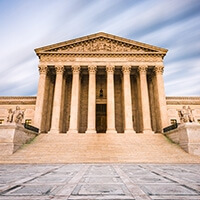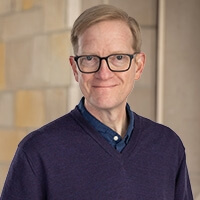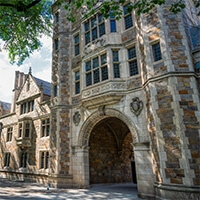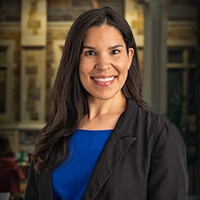I write to provide an update about important developments and growth that are taking place at Michigan Law as a result of conversations between the Black Law Students Association and members of the Law School’s administration. We have been working together to enable the Law School to fulfill its promise of providing an outstanding legal education in a diverse, equitable, and inclusive environment.
Since early June, we have been meeting regularly to plan a path forward for our community. These meetings have been informative and productive. We are developing solutions to longstanding problems and working to dismantle structural racism within the Law School. While these problems cannot be eradicated overnight, we are developing policies and practices to change our teaching and learning framework in ways large and small.
I want to thank our BLSA students for their leadership and for the generous and collaborative spirit with which they have engaged in our continuing talks. They raised their demands in good faith and in response to their experience at the Law School. BLSA’s love for and commitment to our School and student body has been evident throughout and has been critical to making great strides.
We are committed to bringing about meaningful institutional changes that will strengthen and improve the learning environment for Black students, and all students. Our intent is to be responsive and transformative by making adjustments immediately where possible, as well as by developing longer term goals that will require more time and resources to implement. Below I outline some of the steps we have taken already along with developments that are forthcoming to make our learning environment anti-racist:
Planning and Oversight
- I have established the Advisory Board on Race and Racism at Michigan Law, a group of alumni, faculty, and administrators co-led by Professor Dana Thompson, ‘99, and Ellisen Turner, ‘02. The Advisory Board will examine the effects of race and racism in the Law School community and will present recommendations regarding measurable steps that should be taken by the Law School to engage race in constructive ways and to eradicate systemic racism within the Quad. Details about the makeup of the Advisory Board and a form through which students should submit any feedback, can be found here. Getting as much input as possible from students will be crucial to enabling the Board to do its work.
- The Law School has retained Professors Devon Carbado and Jerry Kang to assist in our efforts to promote diversity, equity, and inclusion. Among other things, Professors Carbado and Kang will lead workshops for faculty and students. With their support, we hope to transform the classroom learning experience at Michigan Law so that our teaching is race-conscious and the classroom environment is truly inclusive.
- In response to student feedback, the Educational Environment Committee has been disbanded. Deans Stetson, D’Haene, and Kaul are working with the Law School Student Senate to identify students to participate in an all-student advisory panel for Law School offices that provide services to students.
In the Classroom
- New courses have have been added to the schedule for the Winter semester this year (and we’ll have more to announce soon for future years):
- Professor Devon Carbado will teach a 3-credit Critical Race Theory course;
- Associate Dean Monica Hakimi will teach a seminar called Race and International Law;
- Professor Bill Novak will teach a seminar called Race, Law, and Citizenship; and
- Professor Susan Page will teach Law and Diplomacy: Africa in the ICC.
- Our Criminal Law faculty members have agreed collectively to implement a unit on race (although each professor will constitute and teach the unit differently) for all 1Ls beginning this fall.
- The faculty has approved a classroom participation policy that allows a student to opt out of discussion if a student finds a particular case or topic too painful or uncomfortable to talk about, or if challenging life circumstances make class participation overly burdensome. Each faculty member will include information in their syllabus.
- Our faculty has met repeatedly (in groups organized by subject matter and by 1L sections) for the purpose of gathering materials that will enable us to inform a more race-conscious, race-inclusive pedagogy. Many of those faculty efforts will be guided by expert facilitators.
- Although the University is currently in a hiring freeze, the faculty personnel committee is nonetheless curating a list of promising scholars in Race and the Law whom we plan to pursue when the freeze is lifted or if the Provost approves exceptions to the freeze.
Student Life and Wellness
- The Office of Student Life will be focusing on preparing students to enter the legal profession by amplifying academic excellence, professionalism, and wellness as a means of creating a more open and inclusive learning environment. This includes recognizing a lawyer’s professional responsibility to both recognize, and to not engage in, discriminatory behavior.
- Funding for student groups for diversity, equity, and inclusion programming will be increased (in concert with the Law School Student Senate’s increase in student funding for preview weekends).
- The Office of Student Life will offer expanded wellness programming.
Other Initiatives
- The Law School’s Race, Law & History Program has scheduled a (Zoom-based) research symposium. It also is soliciting applications for its 2020-21 research fellowships.
- The Law School has pledged support for the University’s Poverty Solutions Initiative and its 2020 Faculty Grants Competition on Confronting and Combatting Racism.
BLSA’s sincere demands have benefitted everyone in our community, and on behalf of the Law School, I thank them for bringing these issues forward. The integrity of our community is at stake. This is only the beginning of our efforts to reshape our community into one that is more competent, inclusive, and equitable. We will continue to work to implement and report on the steps we take as these efforts advance.
I am excited about the future that our students and graduates are helping us create.







